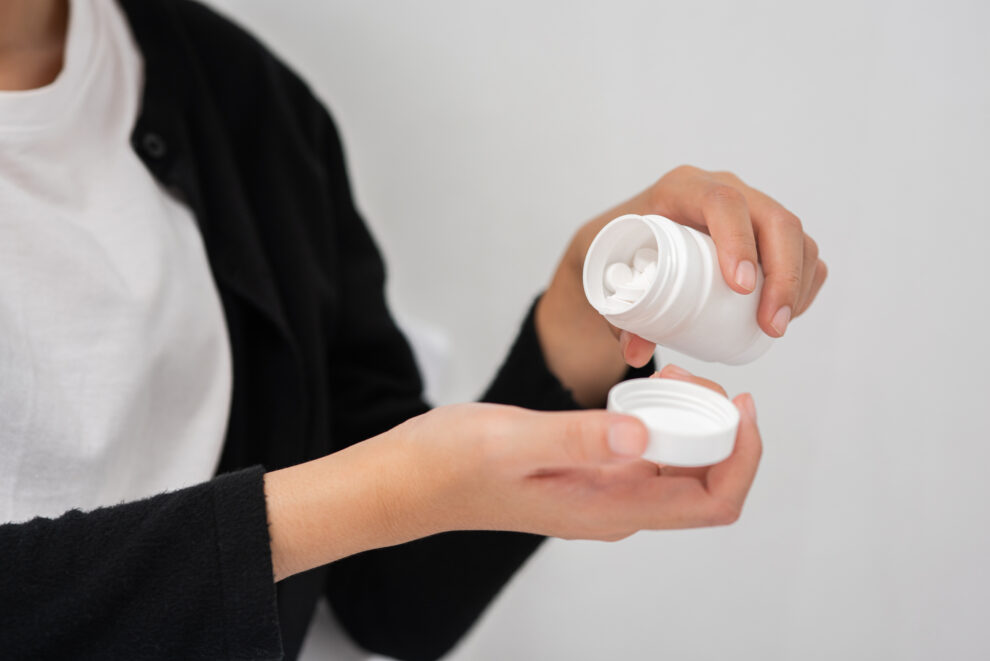A hormone imbalance occurs when there is too much or too little of a hormone in the body. Hormones are chemical messengers produced by glands in the endocrine system. They play a vital role in many bodily functions, including metabolism, sexual function, growth and development, mood, and reproductive health.
There are many different hormones in the body, each with a specific function. When the balance of hormones is disrupted, it can lead to many symptoms. Hormonal imbalances can be caused by various factors, including stress, poor diet, certain medications, and medical conditions such as thyroid disorders or polycystic ovary syndrome (PCOS).
Hormonal imbalances can affect people of all ages and genders, and they can have a significant impact on overall health and well-being. Therefore, it’s important to see a healthcare provider if you are experiencing any symptoms related to a hormonal imbalance. They can perform tests to determine the cause of the imbalance and recommend treatment options.
Hormonal imbalances can be caused by various factors, including:
- Changes in hormone levels during menopause, pregnancy, or other stages of life
- Thyroid gland disorders
- Pituitary gland disorders
- Adrenal gland disorders
- Polycystic ovary syndrome (PCOS)
- Genetic predisposition
- Certain medications
- Stress
- Poor diet and lack of exercise
A healthcare provider can diagnose hormonal imbalances through a combination of physical examination, blood tests, and imaging tests. Treatment may involve medications, lifestyle changes, or hormone replacement therapy.
Symptoms of hormonal imbalance
Here is a list of symptoms that may indicate a hormonal imbalance:
- Weight gain or difficulty losing weight: Hormones play a role in metabolism and weight regulation. Imbalances in hormones such as thyroid hormone or insulin can lead to weight gain.
- Fatigue: Hormonal imbalances can cause fatigue, particularly if the imbalance affects the production of thyroid hormones or adrenal hormones.
- Mood changes: Hormones such as serotonin, dopamine, and cortisol can affect mood. Imbalances in these hormones can cause mood swings, anxiety, or depression.
- Sleep problems: Hormones such as melatonin, which regulate sleep, can be affected by hormonal imbalances. It can lead to difficulty falling asleep or staying asleep.
- Irregular periods: Hormonal imbalances can cause irregular periods, missed periods, or heavy periods in women.
- Low libido: Hormonal imbalances can affect sex drive in both men and women.
- Hair loss: Hormonal imbalances can cause hair loss or thinning hair.
- Dry skin or acne: Hormonal imbalances can affect oil production in the skin, leading to dryness or breakouts.
- Difficulty concentrating: Hormonal imbalances can affect brain function and cognitive abilities, leading to difficulty concentrating or remembering things.
- Constipation or diarrhea: Hormonal imbalances can affect digestion and bowel movements.
It’s important to note that various factors can cause these symptoms, and it’s better to see a healthcare provider for a proper evaluation and diagnosis.
Here are some ways to help balance hormones naturally:
- Eat a healthy, balanced diet: This includes getting enough protein, healthy fats, and fiber, as well as avoiding processed and sugary foods. Some foods that may be particularly helpful for hormone balance include nuts, seeds, leafy greens, and cruciferous vegetables like broccoli and cabbage.
- Exercise regularly: Regular physical activity can help regulate hormone levels and improve overall health.
- Get enough sleep: Lack of sleep can disrupt hormone production, so aim for 7-9 hours of sleep per night.
- Manage stress: Chronic stress can disrupt hormone production, so it’s crucial to find ways to manage stress, such as through meditation, yoga, or other relaxation techniques.
- Avoid tobacco and excessive alcohol consumption: Both smoking and alcohol can disrupt hormone production and balance.
- Take supplements: Some supplements, such as omega-3 fatty acids and magnesium, may help support hormone balance. However, speaking with a healthcare provider before starting any supplement regimen is essential.
- Try herbal remedies: Some herbs, such as chaste berry, black cohosh, and maca root, may help support hormone balance. However, speaking with a healthcare provider before taking any herbal remedies is important.
It’s important to note that everyone is different, and what works for one person may not work for another. Therefore, it’s always best to speak with a healthcare provider before starting any new regimen to address hormone imbalances.
Exercises to balance hormones
There are several ways that you can use exercise to help balance hormones:
- Engage in various activities: To get the most benefit from exercise for hormone balance, engaging in various activities that challenge the body in different ways is important. It may include strength training, cardio, and flexibility work.
- Find an activity that you enjoy: Exercise is more likely to be sustainable if you find an activity that you enjoy. It can be a sport, a group fitness class, or a solo activity such as running or cycling.
- Please don’t overdo it: It’s important to listen to your body and not overdo it, as too much exercise can negatively impact hormone balance. It’s a good idea to start slowly and gradually increase the intensity and duration of your workouts as you become more comfortable and fit.
- Get enough rest: Adequate rest and recovery are vital for hormone balance. It’s a good idea to include rest days in your exercise routine and to get enough sleep each night.
- Work with a professional: If you are interested in using exercise to help balance your hormones, it’s a good idea to speak with a healthcare provider or a certified fitness professional for personalized recommendations on an exercise plan that is right for you.
Everyone is different, and what works for one person may not work for another. Therefore, it’s better to listen to your body and adjust as needed.
HIIT workouts
High-intensity interval training (HIIT) is a type of exercise that involves short bursts of intense activity followed by brief periods of recovery. Some research suggests that HIIT may be effective in improving hormone balance in specific individuals.
For example, HIIT has been shown to increase growth hormone levels and improve insulin sensitivity, which can help regulate blood sugar levels. HIIT may also positively affect testosterone levels, particularly in men.
However, it’s important to note that the effects of HIIT on hormone balance can vary depending on the individual, their fitness level, and the specifics of the workout. HIIT can be a very intense exercise and may not be suitable for everyone.
Suppose you are interested in trying HIIT to help balance your hormones. In that case, it’s a good idea to speak with a healthcare provider or a certified fitness professional for personalized recommendations. They can help you determine if HIIT is appropriate for you and develop a safe and effective workout plan.
Other Exercises For Hormonal Imbalance
There is no one-size-fits-all answer to this question, as the best exercises for hormonal imbalance will depend on the individual and their specific needs. That being said, some exercises that may help balance hormones include:
- Strength training: Strength training can help increase testosterone levels and improve insulin sensitivity.
- Aerobic exercise: Aerobic exercise, such as walking, running, or cycling, can help reduce stress and improve insulin sensitivity.
- Yoga: Yoga and other mind-body exercises can help reduce stress and improve overall well-being, which can positively impact hormone balance.
- High-intensity interval training (HIIT): As mentioned earlier, HIIT may be effective for improving hormone balance in certain individuals.
It’s a good idea to speak with a healthcare provider or a certified fitness professional for personalized recommendations on an exercise plan that is right for you. They can help you determine the best exercises for your specific needs and help you develop a safe and effective workout plan.
Additional tips for naturally balancing hormones:
- Eat enough healthy fats: Healthy fats, such as those found in avocados, olive oil, nuts, and seeds, can help balance hormones and support overall health.
- Limit caffeine intake: Caffeine can disrupt hormone production and interfere with sleep, so it’s important to limit caffeine intake.
- Eat adequate protein: Protein is essential for hormone production and regulation, so include enough protein in your diet. Good protein sources include meat, poultry, fish, beans, and tofu.
- Avoid environmental toxins: Some chemicals and toxins, such as those found in certain personal care products, can disrupt hormone production. Choose natural, organic products when possible.
- Get enough vitamin D: Vitamin D is essential for hormone production, and many people are deficient in it. Consider spending time in the sun, taking a vitamin D supplement, or eating foods rich in vitamin D, such as fatty fish, mushrooms, and egg yolks.
- Consider acupuncture: Acupuncture is a traditional Chinese medicine technique that may help balance hormones and improve overall health.
- Try meditation: This practice can help reduce stress and support overall health, which can help balance hormones.
I would like to add that it’s important to remember that everyone is different, and what works for one person may not work for another. Therefore, it’s always best to speak with a healthcare provider before starting any new regimen to address hormone imbalances. They can help determine the underlying cause of the imbalance and the best course of treatment for you.
It’s also important to be patient and consistent with any treatment plan. It may take time to see improvements, and it’s important to stick with the treatment plan as recommended by your healthcare provider.
Finally, it’s important to remember that various factors can cause those hormone imbalances, and addressing underlying issues, such as stress or unhealthy habits, can be an important part of treatment. In addition, maintaining a healthy lifestyle, including a healthy diet, regular exercise, and stress management techniques, can help support overall health and hormone balance.













vv7tok
Good shout.
Nice
thc gummies for anxiety area 52
best sativa thc carts area 52
mood thc gummies area 52
snow caps weed area 52
live rosin gummies area 52
microdosing edibles area 52
best sativa thc edibles area 52
best pre rolls area 52
thc gummies for pain area 52
thc oil area 52
live resin gummies area 52
live resin area 52
sleep gummies area 52
infused pre rolls area 52
live resin carts area 52
thca diamonds area 52
thc tinctures area 52
WP
distillate carts area 52
indica vape area 52
buy magic mushrooms area 52
full spectrum cbd gummies area 52
weed pen area 52
best disposable vaporizers area 52
hybrid weed vaporizer area 52
thcv gummies area 52
indica gummies area 52
thca gummies area 52
thc gummies
best thca flower area 52
liquid thc area 52
liquid diamonds area 52
thca disposable area 52
hybrid gummies area 52
DG